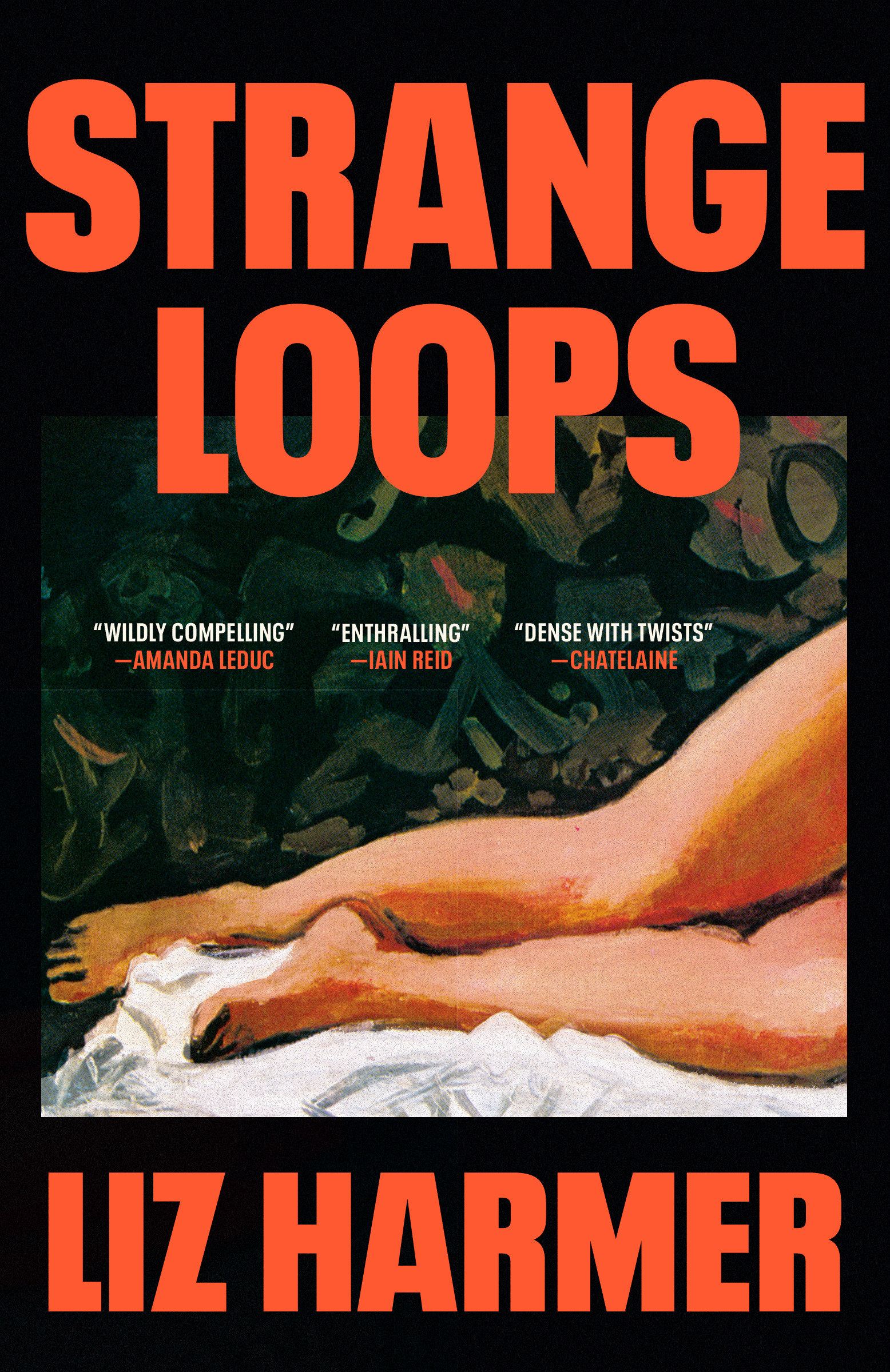A Novel: Strange Loops
13.00 JOD
Please allow 2 – 5 weeks for delivery of this item
Description
“Enthralling. . . . A story that burns with intensity and daring.” —Iain Reid A propulsive novel about the power and paradoxes of desire, from the acclaimed author of The Amateurs.As small children, Francine and her twin Philip shared a seemingly unbreakable bond—but in adolescence the connection frayed, and in adulthood the siblings are locked in a repeating loop of complex, destructive emotions. Matters have reached a breaking point, and Francine, now in her thirties and the married mother of two small boys, is convinced that Philip’s teenaged infatuation with religion and subsequent ongoing obsession with his sister’s “moral impropriety”—sparked by his discovery of her involvement in a forbidden relationship—are to blame.As storm clouds of resentment and mutual betrayal gather ominously, threatening to upend both siblings’ lives and damage their families, Francine unexpectedly finds herself in a situation that mirrors her earlier transgression: stirred and unsettled by her attraction to a wildly inappropriate man. And the one person who suspects is the last person she trusts—her disapproving twin.With the plot twists of a thriller, lean prose crackling with intensity, and big ideas explored alongside the messy truth of human relationships, Strange Loops simultaneously shocks and thrills the reader, all while asking vital questions about faith, love, and desire.
Additional information
| Weight | 0.22 kg |
|---|---|
| Dimensions | 1.63 × 13.21 × 20.38 cm |
| PubliCanadation City/Country | Canada |
| by | |
| Format | Paperback |
| Language | |
| Pages | 256 |
| Publisher | |
| Year Published | 2024-1-30 |
| Imprint | |
| ISBN 10 | 0345811283 |
| About The Author | LIZ HARMER’s first novel, The Amateurs, was a finalist for the Amazon First Novel Award. Her award-winning stories, essays, and poems have been published widely, and she has been a fellow at both the Bread Loaf and Sewanee Writers' Conferences. Raised in Hamilton, Ontario, she now lives in Southern California. |
“Smart, sharp, and magnetic. . . . [Strange Loops] evolves into a chance to reflect darkly on familial bond . . . and to study the human animal, here so capable and incapable all at once.” —Quill & Quire“Gripping. . . . Dense with twists, [Strange Loops] builds to a stunning conclusion that somehow feels both inevitable and unexpected.” —Chatelaine“Exquisite and propulsive. . . . [Strange Loops is] an unsettling story of doubleness, the messiness and irresolvability of power dynamics, and what it means to be a woman who wants, who desires.” —Pickle Me This"A slender, wildly compelling novel that asks infinite questions—a dizzying, kaleidoscopic foray into the desires and fears that make us so imperfectly human. I was compelled from beginning to end—this is a novel that sinks into your very bones." —Amanda Leduc, author of The Centaur's Wife"Lean and enthralling, Strange Loops is brimming with the complexities and questions of human relationships. A story that burns with intensity and daring." —Iain Reid, author of I’m Thinking of Ending Things, and Foe |
|
| Excerpt From Book | ∞FRANCINE, PRESENT.The key was still under the clay pot on the concrete front stoop, and that pot made an unpleasant scrape as Francine moved it. The plant inside had long dried and shrunk and was nolonger identifiable. But the light over the outer door had flared on when she approached, and the hedges on either side of the walk were trimmed, which meant that her mother had been keepingthe place up, regardless of her many threats to sell it or rent it out, to abandon it altogether. On the security pad, Francine keyed in the six digits of her parents’ anniversary. Two short beeps chimed, indicating disarmament.She looked back out into the near-total darkness of the gravel drive. The young man—the boy—was still in the passenger seat, his face illuminated by his phone. She turned again to the task athand: the inner door’s tricky latch and its sticky lock. “What’s up?” the boy said, coming up behind her now. Heput his hands on her shoulders supportively. Or perhaps proprietorially. For months he had been trying to touch just these partsof her body—any part of her body—and she had pretended not to notice when he brushed against her, when, overcome by some enthusiasm, he touched her on the arm. Out of long habit she dodged these hands, but then turned around to kiss him. He was so unlike Jamie, who never seemed to want a thing, who, while gentle, had no passion for her, was self-sufficient and lacking in desperation. The boy, though, was tense with desire. He pulled her bottom lip into his mouth; his mouth was soft, was sure. She had spent so much of her life wanting. The newness of him was half the pleasure. The other half was how purely and openly he wanted her.“Come on,” she said, pulling him inside the kitchen and towards the cupboards, where she found several dust-filmed bottles of Merlot and, way at the back, half a mickey of peach schnapps. The mickey was fifteen, nearly twenty years old now, purchased by her when she was a teenager—an old transgression that, with time, had lost its charge. She felt now, in all her gestures, a regression: she was moving uncertainly, the way a young woman moves, while this boy was moving like a man, opening cupboards, looking for glasses. When she pulled the cork out ofone of the bottles and wine gurgled darkly into one glass and then the other, she couldn’t keep her hands from shaking.“Don’t be scared,” he said. “I’m not scared.”In the car’s dark, the realization that she knew almost nothing about the boy had come crawling over her. The Camry had struggled over gravel roads, had shuddered along dirt ones. He hadcommented on how little light there was beyond the weak path created by the headlights, and she’d assured him that she knew the way. He talked on and on, and after a while his voice soothed her. He made a future for the two of them out of fantasies that, until a few days ago, he’d been forced to keep to himself. “I haven’t told anyone,” he’d said, and named all the friends he might have told, but hadn’t.“Told anyone what?” she’d said, and the words hung there for a moment like the fog from warm breath on a winter’s day.He offered a future. There was so much money. There were cars and houses, resorts and vacations, rooms full of books. The places he’d take her, he said, as if citing the Dr. Seuss book he’d received upon graduating. It was all nonsense. She’d listened to it, already weary, hands on the wheel in the car in the dark.There were several things she had wanted him not to say, but she hadn’t known what these were until he said them. A few times he mentioned his mother, and the word—mom—rang out like an accusation, the bell to wake her from a dream. He had tried to talk about the girls at school, how they weren’t women, and those words, too, she wished he hadn’t said. The word woman made her swell and bloat.Now she quickly downed her wine and poured another glass, keeping her eyes on the boy. They were just several hours down this path and already she’d riddled the whole thing with mistakes.Wrong choice of location, clearly. She hadn’t remembered how far away the cottage was. She might have taken some cash and gone to a hotel instead. Of course she didn’t want to do this ina car, or in a bathroom, in any public place. But why hadn’t she built a fake scenario so Jamie wouldn’t be suspicious? Why hadn’t she asked the boy if he had any good ideas about where to go? Why not buy him a ticket for some weekend destination and meet him there; why not pretend to go to a conference; why not do this in such a way that Jamie would never know? Why the fuck had she left the way she had—I just have to get some air. Don’t leave like this, Francie.I’m going to work, I’ll be home in the morning. Don’t wait up—And then the squeal of her tires. Jamie backlit in the door frame as he held their younger son, both bewildered, both sweet. And still in love with her.The boy picked up his glass casually, took a neat sip. His pants had cuffs at the ankle, his shoes were what she’d have called moccasins. None of his style choices were familiar to her. He pulled at the bottom of his sweater, that small tug the only indication so far that he was nervous. He was unfazed by the wine, even though he wasn’t legally able to buy it himself. He was unfazed by the enormity of the cottage her mother owned, an inheritance from their grandfather, because this boy was a boy of the world, a world where all the people had enormous estates, all the people personally knew famous politicians or actors or somebody. His dark eyes weren’t pretty, exactly, but they were penetrating. They contained wit. He was a good-looking, self-assured boy. Not a victim, hardly a boy at all.She led him out onto the back deck. “We could light a fire,” she said. “We could put on some music.”He pulled a small speaker out of his pocket, pressed some icons on his phone, and a low, heavy beat pulsed out. She recognized the song. She had seen him dancing to it once outside the school, had liked the liquid movements of his legs and arms. She hadn’t yet felt a desire to touch him, only a desire to watch him move. He had looked up at her, the way he always did, with knowledge and recognition. Who could resist the implication of such a look? “You can’t see it in the dark, but there are cornfields all around us,” she said.“Oh, yeah?”“There,” she said, pointing. She imagined the sound of the fields to be dry and rustling, even though it was barely summer.“And there. When we were little, my twin brother got lost in the corn for a long time. It was really scary. They can kind of swallow you up.”“You have a twin brother,” the boy said. “Is he exactly like you?”“My brother?”“I want to know everything.”“No, you don’t,” she said.“I do.” He continued his chatter, told her he’d be going to Pariswith his family in a few weeks, and they always flew first class, and the flight attendants never checked his ID, and his parents let him buy cognac, bourbon, whatever he wanted. These revelations of his naïveté were concerning. She wouldn’t say the words she suspected he wanted to hear—don’t go on that trip, I don’t want you to go—though she was jealous of his whole future, his wholelife, all of the women he would talk to like this.A silence followed. He lifted her hand and began to move his fingers up and down her fingers, as he had tried to do in the car.“In the summer, the corn will be taller than you,” she said, reminding him of his height instead of his age. She was being careful. She wanted, with him, to be a person without needs. To appear to be such a person. She would resist emotions and indulge only her physical pleasures. With him she would be a man, would maintain the power of a man, would preserve every illusion the boy had about her.“The last time I was here,” she said, “the sky was churning. There were tornadoes touching down all over.”It was five years since she had come to the country house. Despite what Jamie called the family “volatility”—or sometimes “voluble volatility,” if he was trying to be cute—her siblings and their spouses had gathered for a weekend under this matriarchal roof to celebrate her mother’s sixtieth. It had taken one day to bring the place to a boil. They’d all screamed at each other. In front of babies, at pregnant women, they’d all screamed.Tonight, as she had walked through the foyer and into the dining room with its darkly glazed hardwood flooring, its Victorian wallpaper in deep reds with small white flowers, past the great room on its southerly side, and now to the back porch, she saw that the feelings from five years ago had, all this time, been here waiting for her. Behind the large French doors, which were bolted open, stood the kitchen island. Five years ago, her mother’s slab cake had sat there for a full day and night, pierced with tiny candles like the flags of a conquering country. It had sunk low in the middle, nearly bald of its icing except where it was marked by the trails of children’s fingertips, a sandcastle half-toppled by waves. Francine had stood there, hugely pregnant and with her son Simon in her arms, overcome by useless devastation. Simon’s real sandcastle had been toppled by waves earlier in the day.Her mother came to stand beside her, saying primly, “Well, this was a foolish idea.”Her father was not given to shouting. Amid the fighting, and the vomit of one child and the bee-sting of another, Dad had stepped quietly outside and stared at the sky. She had followed him out, Simon in her arms then too, the wind tearing at their clothes and hair, to watch the sky’s athletic show. The mid- afternoon world had turned into sudden night. “We’d better get everyone down into the crawlspace,” Dad had said. Francine had snorted. These jackals forced into the crawlspace together? “Why?” Simon said, clutching at her like a wet cat, his fingers digging into the flesh of her arms.“Because,” she said. “Sometimes the roof blows right off the house.” |
Only logged in customers who have purchased this product may leave a review.






Reviews
There are no reviews yet.